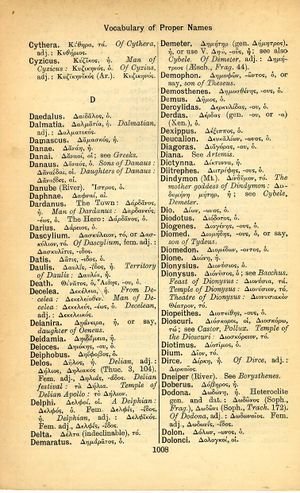Dionysus
οὐκ ἔστιν οὐδείς, οὐδ' ὁ Μυσῶν ἔσχατος → there is nobody, not even the last of the Mysians | there is nobody, not even the meanest of mankind
English > Greek (Woodhouse)
Feast of Dionysus: Διονύσια, τά.
Temple of Dionysus: Διονύσιον, τό.
Theatre of Dionysus: Διονυσιακὸν Θέατρον, τό.
Latin > English (Lewis & Short)
Dĭŏnȳsus: or -os, i, m., = Διόνυσος>,
I the Greek name of Bacchus (not in the Aug. poets), Cic. N. D. 3, 21; 23; Att. ap. Macr. S. 6, 5; Plaut. Stich. 5, 2, 13; Aus. Epigr. 30.—
II Derivv.,
A Dĭŏnȳsĭus, a, um, adj., of or pertaining to Bacchus; Dĭŏ-nȳsia, ōrum, n., = Διονύσια, τά (sc. ἱερά>), the festival of Bacchus, in Greece celebrated every three years (Lat. Bacchanalia), Plaut. Curc. 5, 2, 45; id. Cist. 1, 1, 91; 1, 3, 8; id. Ps. 1, 1, 57; Ter. Heaut. 1, 1, 110 Don.; id. ib. 4, 4, 11.—
B Dĭŏnȳsĭas, ădis, f., a precious stone, of a black color, Plin. 37, 10, 57, § 157.—
C Dĭŏnȳsĭăcus, a, um, adj., of or relating to Bacchus: ludi, i. q. Liberalia, Aus. Ecl. de Feriis Rom. 29.

